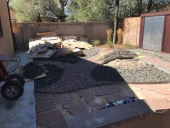posted 5 years ago
I like to put some manure under a tree, deeper than I plant it (with a buffer of a few inches of dirt). If it's real fresh manure (less than 4 months old), better to skip that, and let it age longer, then just make rings a foot or more away from the trunks, where it's not on top of the new roots, but where it'll gradually seep into the soil.
You can still toss any kitchen scraps (especially bananas!), chicken bones, or best of all, fish corpses, in the hole (with two or more inches of dirt over it before planting the tree roots), before planting the tree. I hear rusty nails are supposed to be good long-term (iron and zinc and other minerals) as well - I almost always forget to do that, though. Whatever organic matter, or bones (long-term calcium), you have available is a great bonus if available, but not a necessity.
Planting in the natural soil is actually good for the trees, but supplementing it somewhat is helpful too, when possible. Digging a hole and putting in completely different soil actually isn't good for the tree, because you're raising it to adapt to the wrong soil that it'll grow out of after two years and not be prepared for, or worse, it's roots may try to keep circling inside the soil it's used to, and tangle up its own roots.
Digging square-ish holes also helps (but again, isn't strictly necessary) for the same reason - it helps reduce the roots circling around where the loose soil meets the compact soil.
If you never planted trees before, don't be discouraged if some of them die. That's the nature of learning to raise living plants. I lost a horrible number of trees early on - around 70% (mostly due to flooding). And even now, I lose about 20%. You'll do much better than me, but don't get discouraged by a few here or there.








